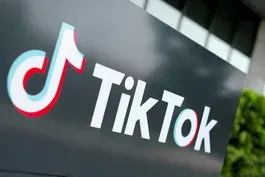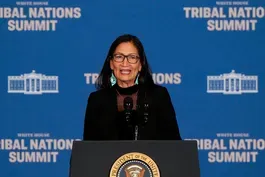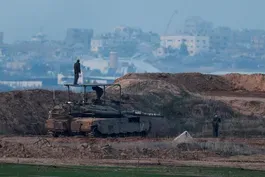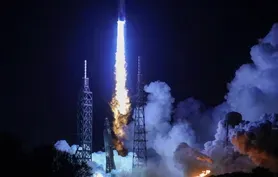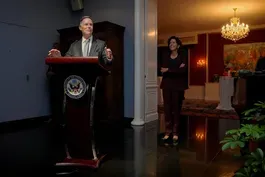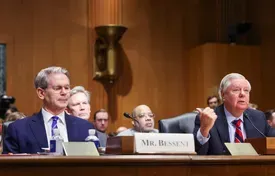
Jon Finer breaks down strategy to reach Gaza ceasefire deal
Clip: 1/16/2025 | 7m 46sVideo has Closed Captions
White House official Jon Finer breaks down strategic steps to reach Gaza ceasefire deal
The Gaza ceasefire deal announced Wednesday largely mirrors a proposal made by President Biden last May. In recent days, President-elect Trump's Middle East envoy joined the Biden team to push the deal to completion. Those eight months have been bloody and have seen shifts in Gaza and across the region. Geoff Bennett discussed more with Principal Deputy National Security Advisor Jon Finer.
Major corporate funding for the PBS News Hour is provided by BDO, BNSF, Consumer Cellular, American Cruise Lines, and Raymond James. Funding for the PBS NewsHour Weekend is provided by...

Jon Finer breaks down strategy to reach Gaza ceasefire deal
Clip: 1/16/2025 | 7m 46sVideo has Closed Captions
The Gaza ceasefire deal announced Wednesday largely mirrors a proposal made by President Biden last May. In recent days, President-elect Trump's Middle East envoy joined the Biden team to push the deal to completion. Those eight months have been bloody and have seen shifts in Gaza and across the region. Geoff Bennett discussed more with Principal Deputy National Security Advisor Jon Finer.
How to Watch PBS News Hour
PBS News Hour is available to stream on pbs.org and the free PBS App, available on iPhone, Apple TV, Android TV, Android smartphones, Amazon Fire TV, Amazon Fire Tablet, Roku, Samsung Smart TV, and Vizio.
Providing Support for PBS.org
Learn Moreabout PBS online sponsorshipGEOFF BENNETT: Returning now to the fragile Gaza cease-fire deal, the agreement announced yesterday largely mirrors a proposal made by President Biden last may.
In recent days, president-elect Trump's Middle East envoy joined the Biden team in Qatar in a bid to push the deal to completion.
For more insight, we turn now to White House Deputy -- Principal Deputy National Security Adviser Jon Finer.
Thanks for being with us.
And Jon, we understand there had been a last-minute hold up in implementing this agreement.
Israel blamed Hamas for reneging on part of the deal, which that terrorist organization denies.
Is the U.S. confident that both sides will be able to put this deal in place come Sunday?
JON FINER, U.S.
Principal Deputy National Security Adviser: So, look, I wouldn't call it a hold up at all.
I think things are continuing to move forward with the implementation of the deal that the president and the mediators announced yesterday.
This was always going to be complicated to implement.
There are a lot of moving pieces.
There's a lot of complexity to the arrangement.
There is zero trust, literally, between the two sides.
But our understanding is that now all of the relevant documents for the deal have been fully approved.
The Israeli government will begin its formal approval process tomorrow.
We expect that to proceed over the course of 24, 48 hours, and then the deal to begin being implemented as soon as Sunday or soon thereafter.
But everything remains on track at this point.
GEOFF BENNETT: Secretary of State Tony Blinken today, he praised president-elect Donald Trump's incoming special envoy to the Middle East, Steve Witkoff, for his work with the outgoing Biden team on this deal.
To what degree was the overall Trump factor key to clinching this agreement, namely, the social media post from Donald Trump last month where he warned of hell to pay in the Middle East if the hostages weren't released by his inauguration?
JON FINER: Well, look, President Biden's diplomatic team was in the principal chair driving this deal forward.
The president himself announced the broad contours of the deal as far back as May.
All of those elements were present in the deal that actually was agreed yesterday.
And the president's special envoy for the Middle East, Brett McGurk, was in the region for almost two consecutive weeks straight, working through the fine print with the Qatari and Egyptian mediators and shuttling between the two sides.
That said, I think the Trump administration played a very important supporting role.
They said the right things about the need for this deal to get done, pressed both sides, as we were, and so we welcomed that participation.
Ultimately, this was about the outcome, which is getting the hostages home, getting humanitarian assistance into Gaza and bringing an end to the fighting, much more than it was about who gets the credit.
GEOFF BENNETT: Well, on that point, once the fighting stops, the humanitarian crisis in Gaza persists.
What's the plan, what's the mechanism to surge badly needed food, water and medical assistance into Gaza to those people who so desperately need it?
JON FINER: So, we have been preparing with the United Nations World Food Program, other NGOs that provide humanitarian assistance, to get ready to fully implement the terms of the deal, which involves 600 trucks a day of assistance surging into Gaza the minute the fighting stops.
And we fully expect the humanitarian community to be ready to do that.
And that's a very important part of getting things right on the implementation side.
Obviously, implementation is going to extend well into the new administration.
This is six or seven weeks in the first phase of the deal.
And so we're going to set the table for a successful implementation.
It will be up to the new administration, the incoming team, to carry that forward.
GEOFF BENNETT: Big picture question here, because critics on the right have argued that the Biden administration really handcuffed Israel in terms of criticizing its tactics, sometimes withholding weapons.
And those on the left say that the Biden White House really enabled Israel to act with impunity in Gaza.
Looking back now, would the administration have done anything different?
JON FINER: Well, looking back now, what I see is a strategic environment in the Middle East in which the United States and its key ally Israel, as well as its other partners in the region, are stronger than they were before October 7.
Their interests are better secured and safer than they were before October 7, in large part because of the collaboration between the United States and Israel.
When Iran sought to strike Israel twice with hundreds of ballistic missiles, it was the United States and a coalition of partners that helped the Israeli Defense Forces defend the country from those attacks.
When Israel decimated Hezbollah, it was the United States that backed Israel's willingness and efforts to do that.
When Assad, the president of Syria, fell and fled the country, it was the United States' efforts, with Israel, that weakened Iran and weakened Russia, Assad's two main backers that prevented them from being able to come to his rescue.
So, Hamas, I think, looked across the region, saw all of its friends and partners in a fundamentally weaker place and felt like it needed to make a deal.
Now, I will not deny that this came at an enormous humanitarian cost.
This is something that we have been acutely sensitive to, and that we have pressed in every day and every conversation that we have had with Israeli officials to increase the amount of humanitarian assistance going into Gaza.
And that is, in many ways, the most important part of this deal, in addition to getting the hostages home, is that there will be a significant increase in relief to people in Gaza, who badly need it.
GEOFF BENNETT: Why didn't President Biden push Netanyahu harder or more publicly to curtail the IDF operations and lessen the civilian costs in Gaza?
JON FINER: So, I mean, to be honest, the thing that was holding back the stoppage of the violence and the halting of the fighting was that there was a deal on the table that the president announced as far back as May, the details of which were continually refined over the course of the summer, that Israel accepted and Hamas didn't.
A number of months have now gone by.
Hamas has gotten to a place where it's under enough pressure that it was willing to actually accept the terms of the deal, with some very minor adjustments and alterations that took place over the course of those weeks and months.
But the holding point, the sticking point, very much so, in recent days and weeks was Hamas' unwillingness to take the deal.
Once they did take the deal, we were off to the races.
And now it is time to actually get the formal agreement with the Israeli government, which we expect over the next day or two, and then to begin implementing, which will provide significant relief.
GEOFF BENNETT: Question about Sudan, because today, for the first time, the U.S. sanctioned the head of the Sudanese Armed Forces, and there are reports out today that Sudan's military used chemical weapons on at least two occasions against a paramilitary group it's battling for control of that country.
How will the U.S. respond?
JON FINER: Well, so the United States has now imposed significant sanctions on both sides of this conflict.
The rapid security forces -- Rapid Support Forces have been sanctioned by the United States and actually designated by the State Department for perpetrating genocide in parts of Sudan.
Today, the United States imposed sanctions, as you said, on the Sudanese Armed Forces for their role in atrocities.
What we have got right now is the most acute humanitarian catastrophe anywhere on the planet as a result of this civil war.
But you have got two sides who, as of now, do not seem to be interested in stopping the fighting.
So the United States is putting pressure on both sides and is trying as hard as we can, along with our partners, to surge humanitarian assistance into Sudan to get some relief to the people.
But until either side, one or both, decides they're interested in actually stopping this war, it is going to be very challenging to get the fighting under control.
GEOFF BENNETT: Jon Finer, thanks so much for your time.
We appreciate it.
JON FINER: Thank you.
Clock ticking on TikTok with ban coming this weekend
Video has Closed Captions
The clock is ticking on TikTok with potential ban coming this weekend (6m 1s)
Deb Haaland on Biden's efforts to preserve public land
Video has Closed Captions
Deb Haaland on Biden's efforts to preserve public land and recognize Indigenous history (6m 20s)
Gazans hope ceasefire deal will bring lasting peace
Video has Closed Captions
Israeli vote on ceasefire delayed as Gazans hope deal will bring lasting peace (4m 33s)
LA bands together to help in midst of wildfire devastation
Video has Closed Captions
LA residents band together to help in midst of wildfire devastation (5m 13s)
News Wrap: Blue Origin launches New Glenn rocket
Video has Closed Captions
News Wrap: Blue Origin successfully launches New Glenn rocket (7m 23s)
Outgoing ambassador analyzes future of U.S.-China relations
Video has Closed Captions
Outgoing Ambassador Nicholas Burns analyzes future of U.S.-China relations (7m 51s)
Trump’s Cabinet picks face questions in Thursday's hearings
Video has Closed Captions
The questions Trump’s Cabinet picks faced in Thursday's confirmation hearings (6m 43s)
Providing Support for PBS.org
Learn Moreabout PBS online sponsorshipMajor corporate funding for the PBS News Hour is provided by BDO, BNSF, Consumer Cellular, American Cruise Lines, and Raymond James. Funding for the PBS NewsHour Weekend is provided by...

